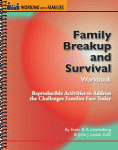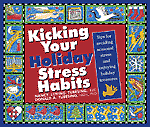Family Breakup and Survival
This article is taken from Family Breakup and Survival Workbook by
Ester Leutenberg and John Liptak, EdD.
In this article, the title care-giver and adults will be used for family members or paid helpers who give direct CARE and are responsible in any way for one or more children and/or teens.
Through out the article, the term breakup will be used to include any breakup, separation, annulment, and/or divorce.
What is a Care-Giver Breakup?
A care-giver breakup is one of the most stressful events that a family could encounter. Separation, and ultimately a breakup, can be very difficult on care-givers, children, and other caring family members.
It is important to distinguish among the various types of circumstances that are included as breakups in this discussion. Here are a few:
• A couple dating who choose to stop seeing each other.
• A legal separation, which often comes before a divorce.
• Annulment, when a marriage is declared null and void.
• Divorce, the dissolution of marriage and the changing of legal responsibilities.
• Separation in which a couple stops cohabitating.
Breaking up can mean many different things to different people. For the purposes of this discussion, we are using the term breakup to include people living in the above situations. Breakups are extremely complicated processes that usually involve phases of a breakup between the two people and their families, and then possible various stages of a grieving process, for all concerned.
Although some breakups end with reconciliation, the stages of grief, the trauma, the issues of child-care, the communications, the visitations, the relationships, the feelings, and the changes still disrupt the family unit in a heart-breaking way. Things that are said, family members remember. Children suffer. How they react depends on their age, personality and the circumstances of the separation process. Families change. The contents of this discussion will help, whether there is reconciliation or not.
The next two sections will provide information related to these two important aspects of any breakup.
The Phases of a Breakup
It is never easy to break up with someone, but the breakup of a relationship can thrust your world into chaos and trigger all types of painful and negative feelings. The process of a relationship breakup follows some fairly distinct and predictable phases.
This model is not meant to be a definitive way that people in a relationship progress toward a breakup. All breakups will be unique and specific to the people involved. Therefore, the model that follows is designed to provide you with a sense of the behaviors, thoughts, and feelings that accompany each of the phases of a breakup.
Phase 1
In this phase, the idea of a breakup often surfaces. The relationship experiences stress and it feels like it is in trouble by the initiator, or by both people. The notion of a breakup is often not directly verbalized, but may be verbalized also.
Phase 2
In this phase, ideas about a breakup are often verbalized. Typically, there is an initiator and a non-initiator. The initiator often has gone through a gamut of feelings and is now focusing on the cognitive aspects of telling the partner. The non-initiator usually feels rejected, anger, confusion, self-doubt and depression.
Phase 3
In this phase, the couple involved in the breakup usually begin to shut down and distance themselves physically from each other. They may stop talking to each other and doing things for each other. The couple involved at this point often look at what happened and who is at fault.
Phase 4
In this phase, the legal process often begins. This tends to be a more cognitive stage than the previous one, and most difficult when children are involved. The couple in the relationship feel the reality that is setting in and they begin to explore how their roles, and their families’ lives will be different.
The phases of a breakup can be devastating to everyone involved in the relationship. It is important to remember how stressful each of these phases are for both the initiator and the non-initiator as they consider how it affects themselves, each other, children, and other family members.
Stages in Grieving a Breakup
Regardless of their makeup and family dynamics, all members of a family proceed through specific stages in the process of grieving a breakup.
Although the descriptors for these stages may differ from what others use, they are simply a guide for better understanding the general issues that family members may experience while going through a breakup. They are not absolute or chronological.
Stage 1 (denial)
In this stage, family members pretend that the breakup is not a big deal and that they can easily move on with their lives. They often talk about their situation and their emotions until the initial shock wears off. Most people in this stage may feel numb about the situation and try to move past it quickly.
Stage 2 (anger)
In this stage, after the initial pain begins to wear off, family members begin to become angry about their situation or others involved in the breakup. They get angry and see themselves as victims of an injustice. In this stage, the anger can range from mild feelings of aggravation to feelings of rage. In this stage family members may often search for ways to vent their anger.
Stage 3 (Bargaining)
In this stage, family members try different tactics to get back what they had. They begin to believe that reconciliation, no matter how bad the situation was, is better than living the way they did in the past, or living the way they are currently. They often seek a “quick fix” for the situation so that they can get back to the way life was before, even if it was not ideal. In this stage, many members of the family may feel guilty about what happened.
Stage 4 (Sadness)
In this stage, family members begin to experience signs of sadness, possibly leading to depression. They may have difficulty sleeping, lose interest in eating, feel exhausted, and are often irritated. In this stage, family members feel pensive and wish the relationship had turned out differently.
Stage 5 (Moving On)
In this stage, family members begin to accept the fact that a breakup might be the best for all people in the relationship, and they are ready to move on. They are interested in releasing the past, living in the moment, and making strides toward a fulfilling future. They realize that it is time to move on and focus on the positivity in their lives.
Stage 6 (release & establishment)
In this stage, family members are ready to release any bitterness and even accept the reality of the situation. They are ready to begin establishing new relationships that will be part of a positive future.
Look for the next blog for the next this series: Stress & Fear Related to a Breakup.


